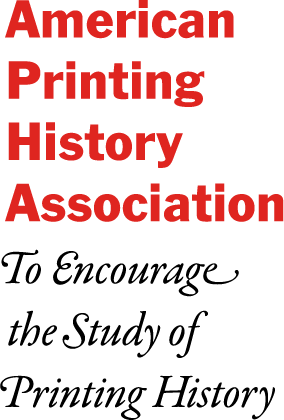John Dreyfus
From The APHA Letter No. 58, 1984, No. Two:
Before a capacity audience at APHA’s Annual Meeting on January 28, 1984, John Dreyfus was named as the recipient of the APHA Annual Award. A special plaque was presented to Mr. Dreyfus and the following citation was read by J. Ben Lieberman, Chairman of the Nominating Committee: “In recognition of a lifetime career of distinguished service in the interest of printing history specifically, as a scholar, writer, editor, lecturer, consultant, and typographer, the American Printing History Association, by a unanimous vote of its officers and Board of Trustees is honored to bestow upon John Dreyfus of London its 1984 Award, conferring upon him the title of Laureate of the Association. Among the achievements which this award salutes are the following: his role in organizing the important Gutenberg Quincentenary Exhibition in Cambridge and designing its catalog and advertising matter; his service as typographical adviser to Cambridge University Press from 1955 to 1982; as typographical adviser to the Monotype Corporation during the same 1955-1982 period; and European consultant to the Limited Editions Club from 1956 to 1977. In all these he helped infuse the operations with historical perspective as well as direct typographical judgment. His service in type development at the Monotype Corporation includes the Univers series, Dante, Sabon, Mercurius, Pepita, Castellar Titling, and Octavian, among many other typefaces. His part in founding the International Typographical Association was just saluted by a telegram. He served as founding vice president in 1957 and then as president from 1968 to 1973, and is now the honorary president. He organized major international congresses in Prague, London, Copenhagen, and, most recently, the Fifth Working Seminar of A. Typ.I. (Association Typographique Internationale) at Stanford University last year. His service on the editorial and selection committee for the London exhibition in 1963, “Printing and the Mind of Man:’ in addition to designing its catalog. His participation in the Pierpont Morgan Library in 1976, “William Morris and the Art of the Book exhibit, and, additionally, his contribution of an essay to the catalog, ‘~illiam Morris, Typographer.” His chairmanship of the Printing Historical Society from 1975 to 1977 with its tangible contributions, including restructuring of the PHS publication program to ensure production of publications on a regular schedule as well as organizing the Caxton International Congress of 1976, for which occasion he wrote the book William Caxton and His Quincentenary, published in New York and San Francisco; his seminal essay, “Typographical Consequences of the Arts and Crafts Movement Through the Establishment of the Private Press,” published in the exhibition catalog published by the National Book League Art and Work in 1975; his service as editor on the UNESCO International Committee to prepare the International Year of the Book, and Charter of the Book, and as co-editor of Dossier Mise en Page which was awarded the Vox Prize; his participation in many organizations including the presidency of London’s Double Crown Club and membership in the Type Directors’ Club of New York, the Bund der Deutscher Buchkunstler and the Ecole de Lure; and as a Fellow of the Royal Society of Arts and the Institute of Printing, as well as a governor of the London School of Printing, and, finally, his direct spreading of knowledge of printing history through contributions such as the Journal of the Printing Historical Society, The Library, Motif, Penrose Annual, Times Literary Supplement, and Fine Print, as well as lectures before such organizations as the International Federation of Master Printers, London’s Institute of Printing, the St. Bride Printing Library, Stockholm’s Graphic Institute, the Library of Congress, the Newberry Library, the Boston Society of Printers, Philadelphia’s Philobiblon Club, the Pittsburgh Bibliophiles, as well as other groups in many American cities and towns. In substantiation of this award, the officers and trustees have also ordered that a plaque be prepared as a tangible token of their gratitude for his efforts and as a permanent summary acknowledgment of his achievements, these being all the more important because of the role of printing as carrier of the intellectual, cultural, and informational lifeblood that sustains the humane society that England and America share.” The plaque presented to Mr. Drefus reads as follows: “This plaque commemorates the 1984 Annual Laureate Award of the American Printing History Association to John Dreyfus in grateful recognition of his services in advancing understanding of the history of printing and its allied arts.”
The excellent talk by Mr. Dreyfus, recounting his own early experiences with printing history, was enthusiastically received. Members will be pleased to learn that APHA intends to publish Mr. Dreyfus’ talk in its entirety.
